BY MIKE METTLER
“Music is astounding, isn’t it?” Graham Nash is genuinely enamored with the wonders of sound — and so am I. There’s always a special twinkle in his eye whenever we get together to talk about the indelible music he’s made since the early 1960s, the new music he’s planning to make next, and how he plans to have it all, both new and old, sound even better. I had just gotten back from Denver when I met Graham, 71, at the Broadway HQ of Random House publishing arm Crown Archetype in New York City on Monday, September 30, 2013 to dive deep into his just-published and quite revelatory autobiography, Wild Tales. After marveling at the shadows and shades present in some amazing NYC skyline photos he had taken earlier in the day on his ever-present camera, we got down to discussing all of the shadows, shades, and sweet sonic details to be found within Tales.
MIKE METTLER: One of the earliest things in relation to the nuances of sound you mention in the book is the first thing anyone hears is their mother’s heartbeat [page 49]. Rhythm is a part of everyone’s life, even before we’re out in the world. We’ve all felt that beat inside, before we were born. It’s in our DNA.
GRAHAM NASH: [nods] Even before you’re out. Yeah, your mother’s heartbeat is the very first rhythm section you hear — the very first drum set. [chuckles]
METTLER: When people ask, “Where did you get that ability from?” you can say, “Well, everybody has that ability from the start; it’s just a matter of how you manifest it.”
NASH: That’s right. And if you practice and build that muscle, it’s like I say often: If I’d been a plumber for 50 years, I’d be a great plumber.
METTLER: It’s that Outliers rule, right?
NASH: 10,000 hours, yes. I really enjoyed that book [by Malcolm Gladwell]. Work, Bill Gates, The Beatles — 10,000 hours, slogging away. Yeah, I did my 10,000 hours.
METTLER: Me too — but I think you’ve put in at least 20,000 hours more than me. Do you still read books in their physical form?
NASH: I do. I have everything: I have a small Kindle, I have the iPad mini. On my side of the bed in my house in Hawaii is what my wife [Susan] refers to as “The Bummer Pile.” [both laugh] Oh yeah, I think fact is way stranger than fiction, so I don’t read a lot of fiction. I’m always reading nonfiction books in The Bummer Pile. [chuckles]
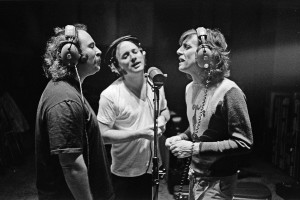
We Three Kings: Crosby, Stills, and Nash, doing what they do best, at Criteria Recording Studios in Miami, in 1977. Photo by and © Joel Bernstein.
METTLER: Back to the beginning. You say on the very first page of Wild Tales, “All my life I’ve had music in my head.” Is there a specific thing that touched that off for you, a tangible moment that you realized as a kid that melody was a part of you?
NASH: Yes. As I said in the book, when I was 6 years old, I looked out my window and felt like I saw a golden city in the clouds after a rainstorm [page 13]. And I could hear the music of the town outside where I grew up [Salford, Manchester, in England]. I could hear the clip-clop of the horses, the iron wheels on the cobblestones, and mothers calling their children to come and eat — you know, that was all music to me.
I got into an elevator this morning, and I said to the people in there with me, “Listen to this music.” And they went, “What?” I said, “Yeah, that chucka-chucka-do-whooop-bzzzzzsche.’ ” Those are the noises the elevator and the gears make. I mean, it’s all music, when you think about it.
METTLER: It’s interesting you say that. There was one time my wife and I were walking past a fast-food stand at a rest stop, and the fryer or something behind the counter began beeping at a certain regular pulse. I turned to her and said, “Listen to that — it sounds just like the organ intro to Santana’s ‘Oye Como Va’!”
NASH: Hmm. Interesting! It’s the same thing, right? Music’s everywhere, kid.
METTLER: I was taken aback when you talked about the time your mother told you that you were living the dream she had for herself, and that you had never known about it until that point [page 291].
NASH: Stunning. It was stunning to me. I was already 34 years old by that time. I never even suspected my mother ever wanted to be on the stage. It wasn’t like my mother would go out to a nightclub and sing and we would go see it, not anything like that. So it was stunning to hear that I was living her life.
Isn’t it amazing to find out things about your parents that you never knew? They’re human beings! They actually make love, and all that stuff, like we do!
METTLER: They’re three-dimensional. And more often than not, they’re putting their own lives on hold so we can go do our own things.
NASH: That’s what we do. That’s what “Teach Your Children” is about.
METTLER: And that’s going to go on forever.
NASH: It is — as long as we’re all still having babies. But, you know, I wrote a song in 1964 with The Hollies called “Too Many People,” about the population explosion. There were too many people being born for us to sustain. And it doesn’t seem like we’re getting any smarter. It was very interesting when the Chinese government came up with that “one child per family” rule. Very interesting, because they say, “We’re doing our best for global warming — how are you doing your part? We did not have 300 million children last year.” A very interesting point.

Mirror Imagination: Self portrait at The Plaza Hotel in London, September 1974. Photo by and © Graham Nash.
The basic truth is this: I am so proud to be an American citizen. I get to speak my mind here. All the shit that David [Crosby] and Neil [Young] and Stephen [Stills] and I have talked about in our lives — we wouldn’t be able to do that in a different country.
METTLER: It’s like what you said in the book about the 2006 CSNY tour, where 10 percent of the audience would actually get up and leave the show, especially when you were performing down South [page 335].
NASH: I would like to talk to those 10 percent now, and ask them again what they think of George Bush, in hindsight. But those 10 percent had every right to leave those shows, and to speak their minds. But so do I.
METTLER: And never don’t do that.
NASH: “Never don’t.” Great title there, right? Write it down. “Never don’t.”
METTLER: I’m writing it down right now, pen on paper. Earlier, you told me you’d “been under the headphones for the past 5 years.” What’s theultimate goal? What are you trying to do?
NASH: To get as much good music out there as possible. I think that music is the common language we all share. It can really make you feel less crazy, maybe make you feel less lonely, or make you feel like somebody else knows what you’re going through. Because that’s what David, Stephen, Neil, and I are — four human beings who have to deal with our shit the same way everybody else does. But we deal with it by creating music and talking about it.
METTLER: I loved finding out that you had a great full-circle moment with Gene Vincent’s “Be-Bop-a-Lula” [pages 23 and 266].
NASH: I did indeed. It was the first record I ever bought, on a 78. Astonishing.
METTLER: Oh, I love that. Do you still have the original 78?
NASH: No — I sat on it, unfortunately, a couple of days after I had gotten it. But that’s why I joined Capitol Records as a solo artist [for 1979’s Earth & Sky]. I told them my lawyer would take care of those funny details about how much money and all that. But the deal was, ”You’ve got me if you leave me in the basement with Gene Vincent’s original 2-track recording of ‘Be-Bop-a-Lula.’ ” Now as I say in the book, as a producer, that would be horrifying to hear about and let somebody do — to pass that tape over magnetic heads any more than you need to. But I did it, and it was a great circle for me.
METTLER: Why does that song speak to you?
NASH: There’s an intense energy in that song. And it’s not like it was a brilliant song of profound meaning. “Be-Bop-a-Lula,” I mean, it’s a “Me and my baby, hey hey hey, let’s go screw in the car” kind of song. It had a power, an energy that just screamed off the record to me.
METTLER: You could get a sense of Gene’s personality just by the way he sang it. That vocal echo, the way that he took his time between each line — laid back, very confident…
NASH: It’s brilliant. And to think it’s on 2-track: mind-blowing.
METTLER: And even better when it’s played on vinyl.
NASH: [smiles] A dear friend of mine owns Mystic Disc in Mystic, Connecticut, and he’s been dealing in vinyl the last 30-40 years. He tells me that in the last year and a half, the increase in vinyl sales has been 762 percent! Isn’t that fantastic?
METTLER: It is. The best-selling album on vinyl last year was Jack White’s Blunderbuss — 33,000 copies sold on vinyl alone in 2012.
NASH: That many on vinyl? Fantastic. The upcoming CSNY 1974 deluxe package accounts for at least eight sides of vinyl in it.
METTLER: Oooh, can we talk about that?
NASH: Sure, let’s talk about it.
METTLER: When will that be coming out?
NASH: I’m 11 mixes away from the end of a 40-song set. I’m deeply into this. Right now, I’m figuring out the cover with my friend Joel Bernstein. We listened to every single thing. We chose the best delivery of the song. The idea was this: Did Neil kill me with his delivery? Did Stephen blow my mind with “Word Game”? Which track, which one, is the best? I wanted those kind of takes. So Joel and I put this thing together. It’ll be 40 songs, and it’s the 40-year anniversary next year. I’m thoroughly expecting it to be out by March 4 [2014].
METTLER: So you’re reclaiming the sound from that tour, quite literally.
NASH: Not only that, but CSNY was an incredibly fine rock & roll band. We could really do it. I mean, not only did we have four interesting individuals and four strong songwriters, but we had the songs. I mean, Neil Young, in 1974, had an incredible burst of songwriting. He has a lot of songs on here, all written around that time, that are brilliant.
METTLER: That would be, what, songs like “Human Highway”?
NASH: [nods] “Human Highway.” “Don’t Be Denied.” “Pushed It Over the End.” “Ambulance Blues.” Just on and on and on. And one of the things about this box set, which was supposed to come out last year, is that I just kept finding things. I found this minute-and-a-half Neil song called “Goodbye Dick,” about Richard Nixon. It’s killer! I had lunch with Neil here in the city about a week ago and I told him about it, and he goes, “Ahh, I remember that one. I only did that once, right?” I said, “Yeah, you only did it once, and it’s fucking brilliant! And I’d like to use it.” And he goes, “Well, go ahead, man. Sounds good.”
METTLER: Did you also talk about putting this out in some form of HRA, high resolution audio?
NASH: Yes. The very first release on Pono, Neil Young’s new high-res playback machine, will be that Crosby, Stills, Nash & Young Live 1974 album. All in 24/192, the highest resolution we can get. Neil has been a high-res fanatic for years, you know.
METTLER: I sure do, and I cannot wait to hear that album in high-res. Ok, one last thing: There’s a telling phrase you used in the book to describe why CSN works together so well: “the pull of gravity” [page 324].
NASH: [smiles] How interesting you bring that up. It’s that pull of the music. And by far, no matter how badly and how great we have treated each other over these last 40-odd years, it’s still the music. That’s why my book starts with the phrase, “It all comes down to the music,” and why it ends with the phrase, “It all comes down to the music.”
METTLER: It’s all right there. And as you say near the end of the book, you’re a slave to the music [page 344].
NASH: [nods] I’m a slave to it. Because my heart got touched. So why shouldn’t your heart be touched?
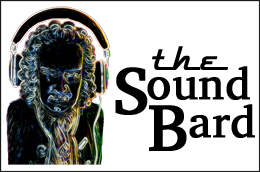
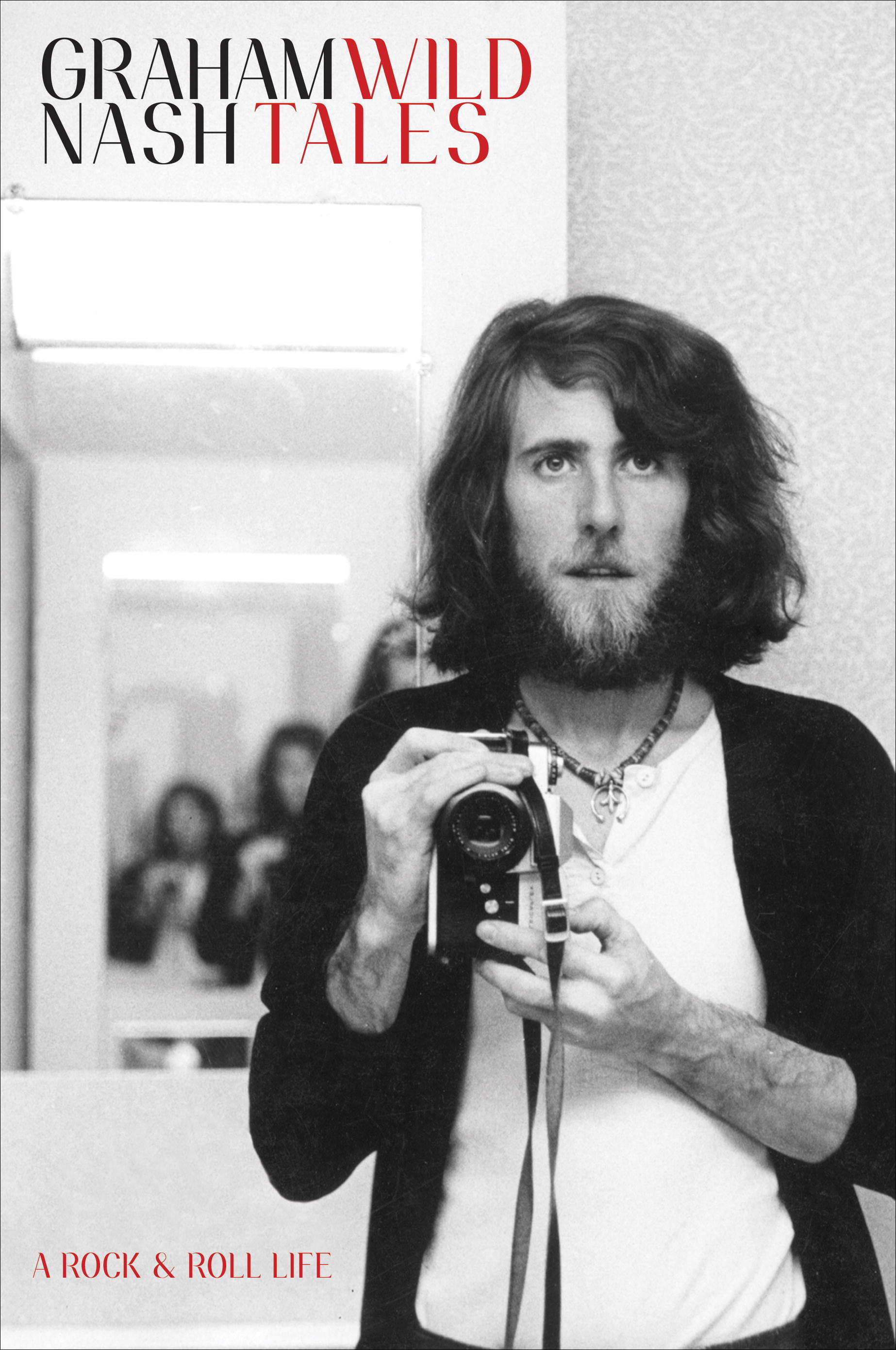
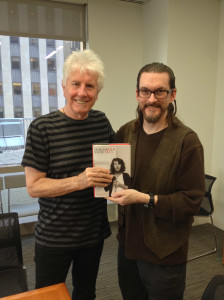
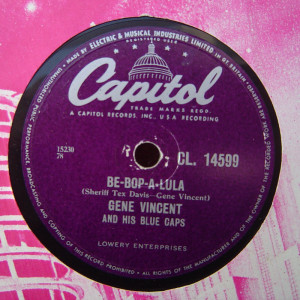
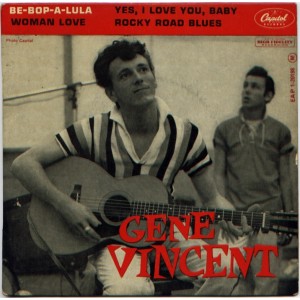
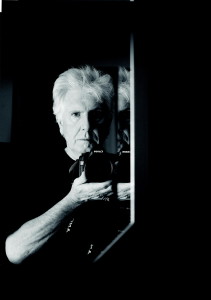
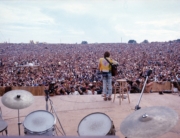
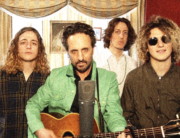
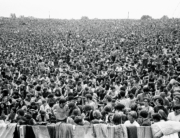
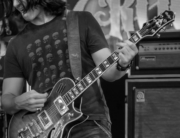
“It all comes down to the music.” That says it all. Thanks for a wonderful interview.
It really does, doesn’t it? Thanks for the kinds words, Anthony. Keep an eye on the site, as my crystal ball tells me interviews with the “C” and “S” portion of the CSN equation will be showing up here soonishly…
MM
The SoundBard
CSN was my intro to vocal harmony. I wore out all of my original CSN and CSNY records in the 70’s. I also wore out their track on the Woodstock album.
I still love vocal harmony. I hope that all of CSN and CSN&Y tracks will become available on high rez that won’t wear out. To me it is timeless music (with or without those ’60’s substances we don’t admit to our kids).
Thanks, Rev. I sat down with David Crosby in New York this past Monday (January 27), and he’s as passionate about hi-res CSN (and sometimes Y) as we are, so I suspect we’ll be hearing more of their music that way sooner than later. By the way, his new solo album, Croz, is available as a hi-res 192/24 download from HDtracks.com.
MM
The SoundBard
I’m already on it!
Just loving the hi rez music! Sometimes, when all the pieces fall together and when I close my eyes, the only way I know I’m not at a live performance is I don’t hear the sounds of people shuffling around and I’m a little too comfortable on the couch 🙂
PS Thanks for the interview!
[…] An extended version of this interview appears on Mike Mettler’s own site, soundbard.com. […]